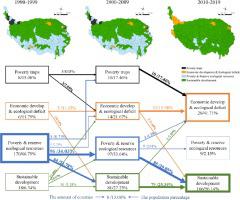Resources, Conservation and Recycling ( IF 11.2 ) Pub Date : 2022-07-27 , DOI: 10.1016/j.resconrec.2022.106552 Ying Pan , Jin Zhu , Yanjie Zhang , Zhennan Li , Junxi Wu

|
In 2021, China announced the elimination of extreme poverty nationally. One region of extreme poverty in China was the Tibetan Plateau, which provides crucial ecosystem services. It is important that measures intended to eradicate poverty on the Tibetan Plateau do not sacrifice ecological resource security and cause ecosystem degradation. In this study, the variations of the relationships between poverty eradication and ecological resource security were analyzed by defining the relationships into four patterns of poverty traps, economic development with ecological resource deficit, poverty with reserve ecological resources, and sustainable development. The variations of the four patterns during the previous three decades were analyzed and future variations were estimated under different scenarios of ecological resource consumption. Results showed that consumption of the ecological resources of the Tibetan Plateau increased during the previous three decades, with the average value changing from 119.0 to 180.8 g C m−2 a−1. Most counties in poverty with reserve ecological resources have become counties with sustainable development, and ecological restoration has benefitted ecological security substantially. However, it has been difficult for counties in poverty traps and with ecological deficit to become counties with sustainable development because the ecological deficit could not be reversed owing to the ever-increasing consumption of ecological resources associated with improved living standards. Scenario simulations revealed that many counties currently exhibiting sustainable development would slip back into ecological deficit in coming decades if consumption of ecological resources associated with production and personal living standards continued increasing, or even remained constant at the average level of the previous decade. Therefore, to support long-lasting sustainable development of the Tibetan Plateau, policies should be proposed that simultaneously enhance ecological restoration and break the link between ecological resource use and economic development.











































 京公网安备 11010802027423号
京公网安备 11010802027423号